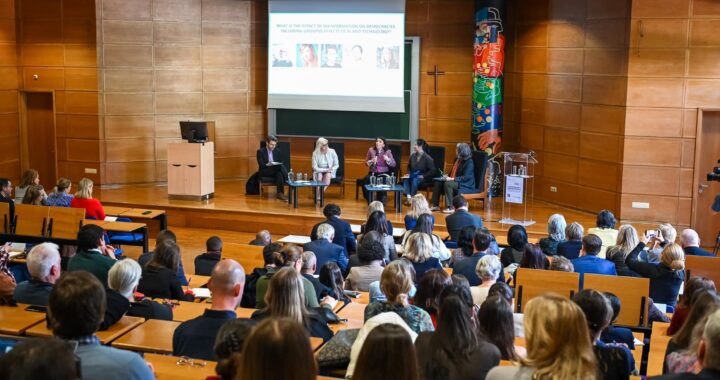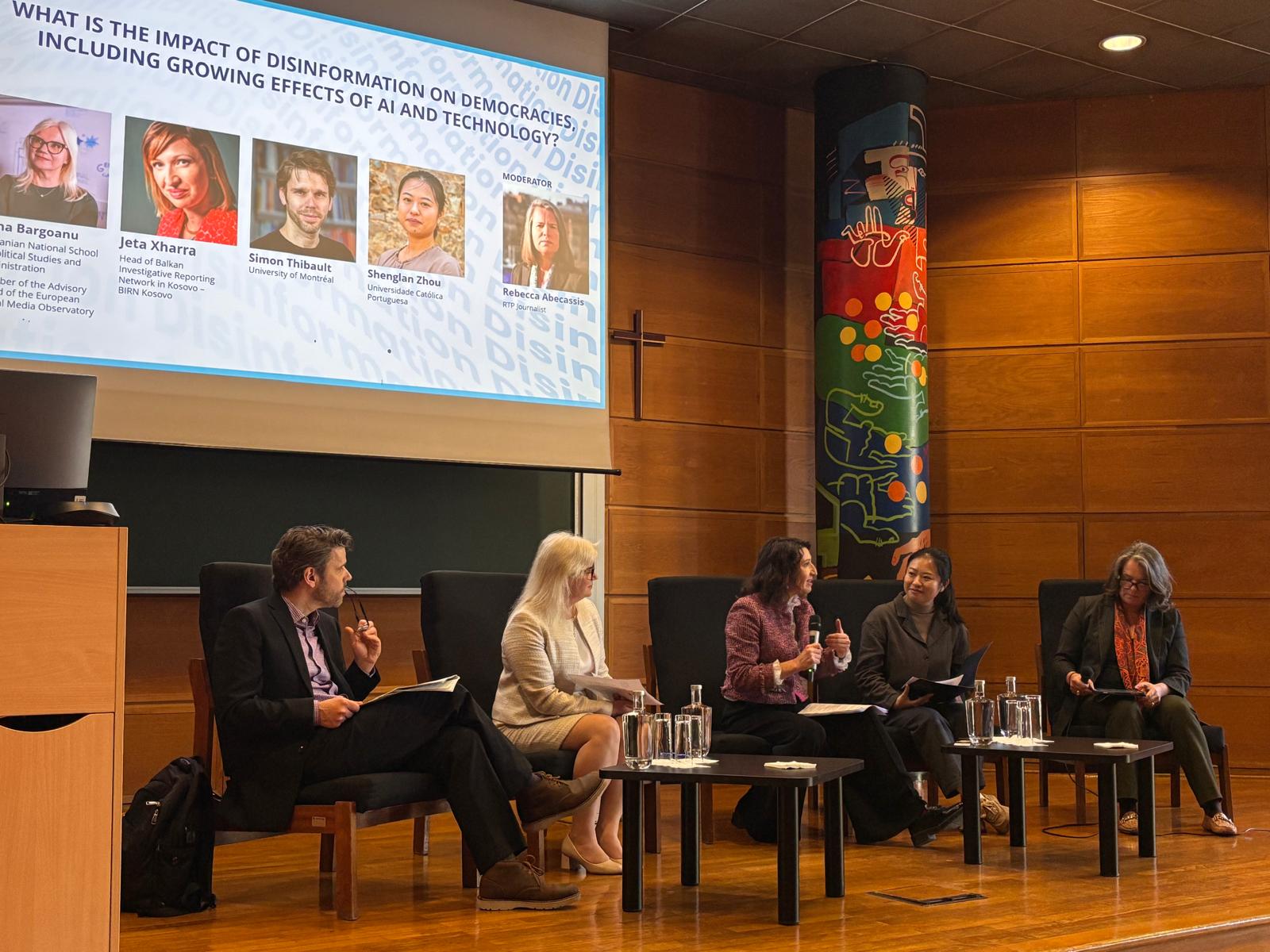

 Jeta Xharra, Director of BIRN Kosovo, speaking at the 'Truth in the Age of Disinformation' conference in Lisbon, Portugal, on March 24, 2025. Photo: Edona Maloku.
Jeta Xharra, Director of BIRN Kosovo, speaking at the 'Truth in the Age of Disinformation' conference in Lisbon, Portugal, on March 24, 2025. Photo: Edona Maloku.
A conference held in Lisbon on March 24 tackled the growing concerns of women being targeted online by disinformation campaigns.
Disinformation campaigns targeted women more viciously than men who ran for members of parliament in the February election in Kosovo.
This was the conclusion that Jeta Xharra, the BIRN Director of Kosovo, presented at the “Truth in the Age of Disinformation” conference in Lisbon on March 24, organised by the Association of Women Ambassadors, AWA, in Portugal. Edona Maloku Berdyna, Kosovo Ambassador to Portugal, was present and ensured that Kosovo journalists were represented in panels alongside speakers from Portugal, Romania, Ukraine, Canada, and Chile.
Maloku Berdyna pointed out that Xharra made a compelling point about the effects of gender-based disinformation that is particularly hurting women in public life.
“She showed how women who hold important positions are now challenged to move from the so-called ‘women in power’ to ‘women in self-defense’ position because of this targeted gender-based battle of disinformation that affects them and their families. As a result, this proves to be discouraging for aspiring women to enter politics as well, thereby seriously affecting women’s representation and our democracies,” Maloku Berdyna told Prishtina Insight.
Portugal’s President Marcelo Rebelo de Sousa in the conference’s closing speech commented, “less women have an interest to enter the foreign service also than in the beginning of my career”.
However, Xharra said there is, after all, one bright side to the disinformation campaign that targeted women more than men in this election.
“The good news is that the three most targeted women by disinformation campaigns in this election, Mimoza Kusari of VV party, Hykmete Bajrami of LDK, and Ganimete Musliu of PDK, were also the most voted women by the electorate in Kosovo, which means that people did not buy all the fake news and bullying language that was spread about these women; in the end, these women became the most voted members of parliament despite all the hate in fake news about them.”

President de Sousa also said that the EU, in particular, needs to define “collective responses” to counter disinformation, which necessarily implies mobilizing the European Union and other democratic allies “to study and protect Democracy”.
The path to free and sustainable use of digital platforms also involves promoting “digital literacy.” In the media, it will be necessary to “ensure the conditions for free and strong journalism.”
Pedro Calado, representative of the Calouste Gulbenkian Foundation that gives grants to increase digital literacy in Portugal, explained that their studies show that only a small number of students in Portugal read newspapers.
“Last week, in a school in Évora, in the south of Portugal, when asked who had ever read a printed newspaper, in a room of 150 students, only 10 raised their hands. And when asked who had consulted an online newspaper in the previous week, the positive response came from 5 of the students sitting there,” said Calado.
“This is the type of challenge that we are facing”, said Calado.
Nelson Ribeiro, Vice-Rector of the Catholic University, which was co-organiser of the conference, also highlighted the fundamental role that information plays in all regimes. “It is used to shape people’s reality, influencing the way citizens vote and accept policies that go against their own interests and those of their communities.”
Ribeiro recalled how two decades ago “we were promised a more transparent world,” however, “not only did social networks not contribute to the expansion of Democracy,” but today “they are a platform for weaponizing history.”
Élise Racicot, Canadian Ambassador to Portugal and President of the AWA, recognized the importance and urgency of this debate, as “it is a universal truth that disinformation has an impact on our democracies.”
Maloku Berdyna stressed that “through this participation we promoted the voice of our country in public diplomacy alongside speakers from Portugal, Romania, Ukraine, Canada, and Chile, among others.” This is also important because Romania, Ukraine, and Chile have not recognized Kosovo.
“On the other hand, I was convinced that Kosova can bring a unique perspective to the topic of disinformation: one that reflects the particularities of how post-war countries are specifically targeted by foreign malign influences and how our contexts are affected by disinformation as a result,” she added.
Racicot, as the leader of the AWA, reiterated that the conference “brought together diverse voices, from a wide range of countries, across many continents, in a timely dialogue with leading experts on important topics such as disinformation and democracy.”
25 March 2025 - 14:09

The public was flooded with disinformation during the election period ...

Kosovo’s tradition of interfaith coexistence has increasingly become...

The findings of a BIRN documentary detailing Kremlin-linked disinforma...

At a moment when democracy is increasingly shaped and shaken by digita...